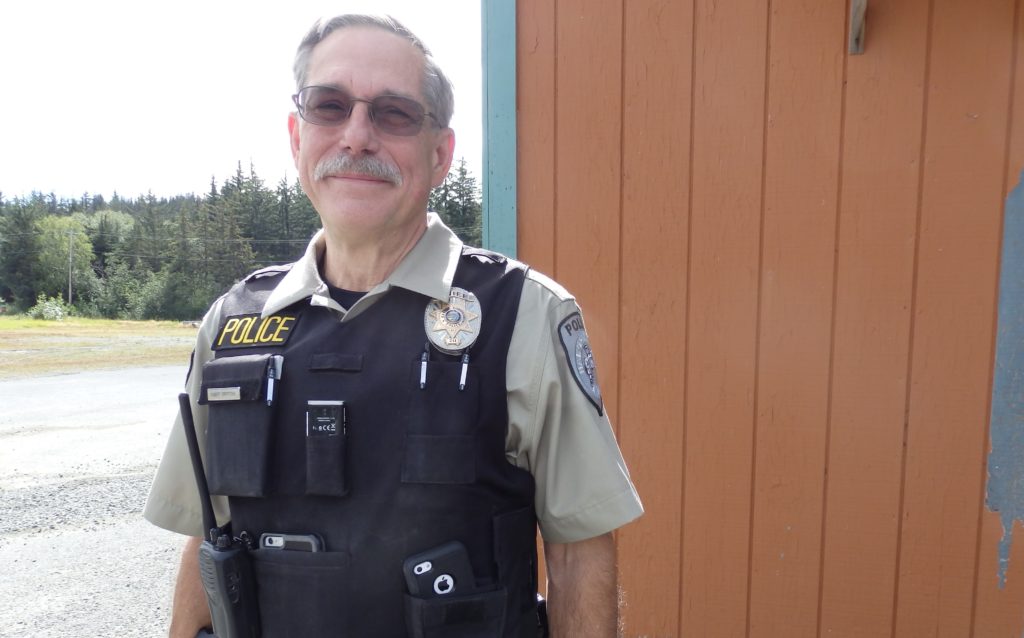
Interim Police Chief Robert Griffiths addresses the crowd at a public forum on Tuesday. (Jillian Rogers)
About 30 Haines residents gathered on Tuesday evening to hear the interim police chief’s update on improvements to the department. Among the upgrades was a more efficient evidence storage system, safer jail cells and an updated policy manual. The chief also announced that his time in Haines might be limited.
The truth is, a lot of people like Robert Griffiths and want him to stay. But Griffiths told the crowd Tuesday that he’s waiting to hear back about a job somewhere else before deciding to stay in Haines. He said he’ll make his decision within the next week.
That announcement came at the tail end of a meeting Griffiths hosted about improvements in the department. Those improvements were initiated by a recent audit that condemned the agency for a myriad of shortcomings. Griffiths said one of the biggest enhancements is how the department stores and tracks evidence. He said it is now kept in a more secure, organized fashion. Griffiths mentioned the mystery evidence room that was discovered earlier this month.
“We knew there was a door there, we just didn’t know what was behind it,” he said. “Nobody I asked, even the dispatchers because they don’t go up in that room, they didn’t know what it was.”
He said the length of time that evidence has to be stored depends entirely on the case. Physical evidence from unsolved murders or sexual assaults is kept, literally, forever. But some is only held for 90 days.
“The reality is I’ve got evidence up there from back into the ‘70s, for cases that were resolved long, long, long ago,” Griffiths told the crowd. “It was that they didn’t do a good job in putting in there and properly packaging it and everything else it was that they did a horrible job of tracking it afterwards and getting rid of it when it was time to get rid of it.”
They discovered containers and bags of evidence along with four big boxes of expired prescription medication that were later burned. The police department announced last week that they will no longer work with the Drug Enforcement Agency to dispose of expired or unused prescription meds. The department said it is now up to community members to “dispose of their own expired or unused medications in the safest manner they can, with the resources they have available to them.”
The jail cells got a mini-facelift, with potentially harmful hazards fixed to lessen the risk of detainees hurting themselves. Griffiths said along with ongoing enhancements to things like consolidating equipment, and updating the policy and procedures manual, regular audits are also in the department’s future.
“Part of our problem, historically, has been we haven’t had enough eyes on the department and we haven’t been transparent enough to the community to address issues when they come up and to identify them early so they can be fixed,” he said. “So the recommendation was made that every year we have a similar style audit. It doesn’t have to be by the same person, it doesn’t have to cost the same amount.”
After the presentation, Griffiths opened the floor to questions and comments from the public. One of the first matters brought up was the borough’s relationship with Haines Animal Rescue Kennel and whether they can work it out.
Late last week, the borough and HARK negotiations stalled over payments for animal control services. Griffiths assured the group that negotiations are ongoing and both parties want the service to return to HARK. Griffiths said that HARK will get paid this week for the nearly three months they provided animal control services this summer with no compensation.
“The issue has been basically a fundamental business disagreement on what we’re buying for our money, for your money,” the chief said. “That is still an ongoing and active conversation. It hasn’t ended whatsoever.”
The minor offenses ordinance, which was passed by the borough assembly last week, also crept into the conversation. A residents asked Griffiths about enforcement and the potential for civilians writing citations. He assured that whoever is chosen to uphold the minor offenses ordinance will be educated accordingly.
“They’ll be a sworn individual, which means that they’re swearing to uphold to abide by the borough charter and the constitution, state and federal constitution. They’re going to have to have adequate training; the definition of adequate has yet to be determined. But I can tell you right now, these people know will only be responsible for a certain section of code and they know that section far better than I do.”
Among the many other topics Griffiths addressed was marijuana and how the new laws might affect, or not affect, the police and the community.
“Dealing with marijuana itself, the possession of it and everything else,” he said. “It’s not going to be a problem because I don’t have to do anything anymore, right? You have almost as much as you want and you can grow it in your house and everything else. So, it’s going to relieve a little bit of the load there. But that’s not the real question, the real question is what is the impact to the community of the drugs.”
Griffiths went on to compare the effects of marijuana to that of alcohol and hard drugs, sparking more conversation about use and local laws in Haines. The marijuana initiative passed in Haines with 67 percent in favor of legalization.
The conversation around local marijuana regulations will continue next week with a Chamber of Commerce forum featuring Cynthia Franklin from the Alcoholic Beverage Control Board. The forum is slated for Oct. 6, Election Day, with the location to be determined. KHNS will be there and will have more on the great pot debate next week.









